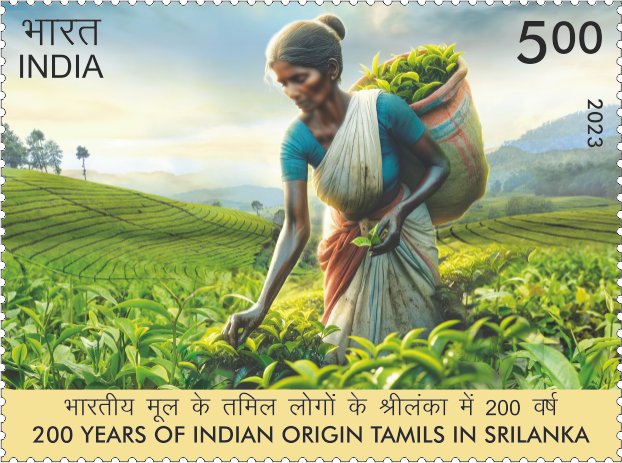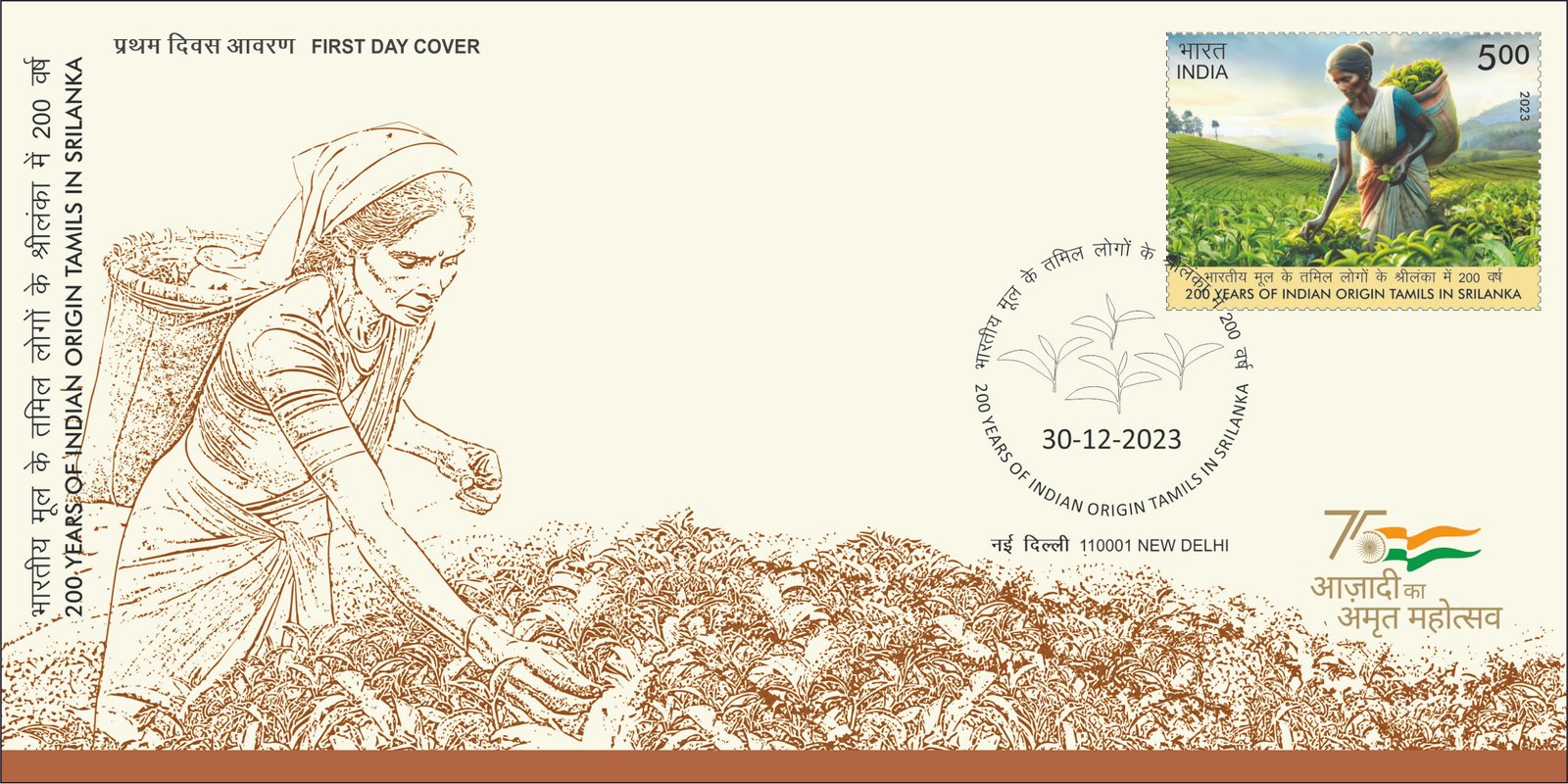200 Years of Indian Origin Tamils in Sri Lanka

Technical Data
| Date of Issue | December 30, 2023 |
|---|---|
| Denomination | Rs. 5 |
| Quantity | 301,850 |
| Perforation | 14¼ |
| Printer | Security Printing Press, Hyderabad |
| Printing Process | Wet Offset |
| Watermark | No Watermark |
| Colors | Multicolor |
| Credit (Designed By) | Ms. Nenu Gupta |
| Catalog Codes |
Colnect codes IN 2023.12.30-01 Michel IN 3967 Yvert et Tellier IN 3618 Stanley Gibbons IN 3891 |
| Themes | Anniversaries and Jubilees | Emigration | Tea | Women |
Arrival and Early History
The Indian Origin Tamils (IOT) of Sri Lanka, also known as Malayaga Tamilar or Hill Country Tamils, are descendants of workers who migrated from Tamil Nadu to Sri Lanka in the 19th and 20th centuries. The first group arrived in 1823 to work in the coffee estates of then Ceylon. Over time, they also became integral to the cultivation of tea, rubber, and cocoa in the island’s central highlands, known as the Malayagam or Hill Country.
In addition to plantation workers, another group of Tamils migrated in the 1900s as entrepreneurs, traders, and grocers, establishing themselves as part of the island’s trading community. Thus, Indian Origin Tamils played a vital role not only in agriculture but also in commerce and enterprise.
Contribution to the Plantation Economy
Indian Origin Tamils were instrumental in the development of Sri Lanka’s plantation sector, which became the backbone of the island’s economy under British rule. Coffee, and later tea, brought international recognition to Ceylon, but the prosperity came at the cost of immense hardship for the Tamil labourers.
During the 1830s, coffee estate workers were not given proper wages but instead forced into a barter system, exchanging coffee beans they collected for basic commodities. This exploitative system persisted for decades, and the plight of these workers only began to gain international attention after nearly a century of migration.
Struggles and Statelessness
The 1911 Census of Ceylon first enumerated Indian Tamils as a separate ethnic group, by which time they had become the second-largest community on the island. However, their struggles intensified after independence.
- The Ceylon Citizenship Act of 1948 stripped Indian Origin Tamils of their citizenship, rendering them stateless.
- Without citizenship, they were denied representation in Parliament and excluded from progressive legislation, leaving their housing, health, and education needs neglected.
- From 1948 to 1964, they lived in limbo, forgotten by successive governments.
In 1952, under the leadership of Soumyamoorthy Thondaman and others, the Ceylon Workers’ Congress (CWC) launched a Satyagraha campaign at Galle Face Green to demand representation. This marked the community’s entry into political activism and trade unionism, as they also aligned with the Lanka Sama Samaja Party (LSSP) in fighting for workers’ rights.
Citizenship and Integration
The process of granting citizenship was long and arduous. Over the decades, through a series of political negotiations and legislation, Indian Origin Tamils gradually secured their rights.
- Citizenship was granted in phases, with many families enduring decades of statelessness, economic hardship, and sacrifices.
- The final step came in 2003, when 300,000 stateless IOTs were formally granted Sri Lankan citizenship, thanks to a Bill introduced by Arumugam Thondaman.
This milestone ended generations of statelessness, enabling the community to integrate fully into Sri Lankan society.
India’s Support and Renewed Recognition
India has consistently supported the welfare of Indian Origin Tamils in Sri Lanka.
- In 2017, Prime Minister Narendra Modi visited the central highlands and inaugurated 4,000 houses built with Indian assistance, alongside announcing 10,000 more homes for IOT families.
- On 21 July 2023, during Sri Lankan President Ranil Wickremesinghe’s visit to India, PM Modi announced new development projects worth ₹75 crore for IOT citizens. This was symbolic, marking both the 75th anniversary of India–Sri Lanka diplomatic relations and 200 years of IOT migration.
- On 2 November 2023, Union Finance Minister Smt. Nirmala Sitharaman graced the “NAAM 200” celebrations in Sri Lanka, organised to commemorate this bicentenary milestone.
Cultural Identity and Legacy
Despite immense hardships, the Indian Origin Tamils preserved their Tamil language, culture, traditions, and faith. They contributed to Sri Lanka’s economic development, cultural diversity, and social fabric. Their struggles and resilience over two centuries remain a testament to their enduring spirit.
Commemorative Stamp Issue
To honour their 200-year journey, the Department of Posts issues a Commemorative Postage Stamp on “200 Years of Indian Origin Tamils in Sri Lanka”. This stamp recognises their sacrifices, acknowledges their struggles for dignity and rights, and celebrates their invaluable contributions to Sri Lanka’s plantation economy, culture, and society.
First Day Cover

